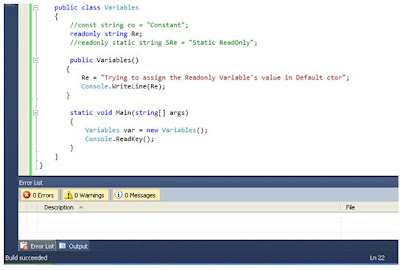These are
very common keywords and are quite confusing. So today we will discuss these
keywords and try to understand them.
1.
Const: Const is nothing but
"constant", a variable of which the value is constant but at compile
time. And it's mandatory to assign a value to it. By default a const is static
and we cannot change the value of a const variable throughout the entire program.
Here I have created a class named Variables and
defined all three variables, so first let's play with const.
Here I tried to de-initialize the const
variable, it gaves me an error like "A const field requires a value to be
provided". Ok now I initialize a value for this variable and
try to change it further in the class.
Here I have created a static constructor, default constructor,
parameterized constructor and a Simple Method. I tried to change the value of
the const variable everywhere but once I assign the value, I am unable to
change it again since when I do it gives me a compile time error as you can see
in the snapshot above.
Now let's on to the readonly keyword.
Now let's on to the readonly keyword.
2. Readonly:
Readonly is the keyword whose value we can change during runtime or we can
assign it at run time but only through the non-static constructor. Not even a
method. Let's see:
Here first I
try to initialize the value in the static constructor. It gives me an error.
Which you can see above.
Now I try to change the value in a
method, see what happened:
Here, it is
also giving an error that you can only assign a value either through a variable
or a constructor.
Now try to change the value in the
default constructor.
Now in the snapshot above you can see it's built
successfully without an error, warning or messages. Let's check if there is a
runtime error. OK.
Now here we
can see that there is not a runtime error and the value was assigned
successfully to the Readonly variable.
Now one gotcha is, now that you have
assigned the value, can you change this value again ???
Let's try to change the value again.
Here I created a parameterized constructor
and created a new object, and passing a value as "Hello Frend'z" and
as I built it, it gave me the result "Build Succeeded". Now
let's move ahead and check for a runtime error:
See guys. There is no runtime error !! And
the value can be changed again and again through a constructor.
Now move ahead to Static Readonly variables.
Now move ahead to Static Readonly variables.
2. Static ReadOnly: A
Static Readonly type variable's value can be assigned at runtime or assigned at
compile time and changed at runtime. But this variable's value can only be
changed in the static constructor. And cannot be changed further. It can change
only once at runtime. Let's understand it practically.
Now in the preceding you can see that
I used two variables, one is not assigned and another is assigned, and the
static constructor. Now in the static constructor you can see that the
unassigned variable is being assigned and the assigned value is being changed.
And there is no compile time error. Further I try to again change this
variable's value. See what happened:
As you can see in the above, I created Default,
Parameterized Constructor and Method and tried to change the value again here.
But I am getting a compile time error for all.
Const
|
Readonly
|
Static Readonly
|
mandatory to assign a value at Compile
time.
|
Not mandatory to assign a value
|
Not mandatory to assign a value
|
By default a const is static and we cannot change the value of a const variable throughout the
entire program
|
value we can change during runtime or we
can assign it at run time but only through the
non-static constructor. Not even a method.
|
value can be assigned at runtime or assigned
at compile time and changed at runtime. But
this variable's value can only be changed in
the static constructor.
|












0 comments:
Post a Comment